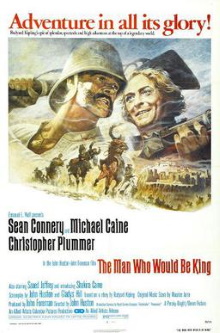
This film adaptation itself is only moderately well known but the short story by Rudyard Kipling is very famous, not least because of the impressive title, and is often referenced in other media. I know that this film is horribly regressive and anachronistic by today’s standard but I thought it might be fun to watch and of course I was looking forward to Sean Connery and Michael Caine in their prime working with each other.
In British India journalist Rudyard Kipling gets to know former soldiers Peachy Carnehan and Danny Dravot when one of them tries to pickpocket him. They desist when they realize that all three are Freemasons and later recount to him their plan to travel to little known Kafiristan. They intend to use modern weaponry to install themselves as kings there and loot the country. After an arduous journey they make it there and even manage to come across a former Gurkha soldier, the sole survivor of a previous expedition, to translate for them. By promising a local chief that they will defeat all of his enemies, they manage to raise and train their own army. They then use the army to roll over village after village, growing their forces all the while. During a battle Dravot is hit by an arrow but it is caught in his bandolier and leaves him uninjured. This leads the locals come to believe that he is a god. They are called to the holy city of Sikandergul where the high priest tests the claim that Dravot is the son of Alexander the Great.
Given that the source material is from Kipling who actually wrote The White Man’s Burden, it is no surprise how this film is rife with racism and white paternalism. The locals are depicted as being superstitious, stupid and uncivilized, and as such Carnehan and Dravot are able to dupe them with contemptuous ease. With only about twenty rifles, the duo are able to raise an army that easily conquers the entire country. Just in case you’re feeling sorry for the locals, the film shows how bereft of morals they are by showing them brazenly executing prisoners, playing polo with their skulls. The first chief they meet offers the duo the use of the any of his numerous sons and when they refuse, offer his sons instead. While it’s true that the film doesn’t portray Carnehan and Dravot as being good people, there’s still an unmistakable sense of Western superiority that suffuses the entire film and special affection is shown to the quaint rituals and customs of the British military. As awful as Dravot’s comportment is, the film still redeems him by having him go down while singing “The Son of God Goes Forth to War”.
So yes, this is a very politically incorrect film with a truly execrable message to impart. Still it can’t be denied that this is all very well made. Caine probably overacts but his character dynamic with Connery is fantastic and both look like they are having so much fun playing off of each other. It seems that both actors often cite this as their favorite film. The action is thrilling, the scenery, from Morocco it looks like, is suitably spectacular, plus the references to Alexander the Great and the Freemasons, adds just the right amount of mysticism to seem intriguing without going overboard. I know that it’s wrong to see anything noble in Kipling’s brand of nostalgia for the British Empire but since I am English educated I can’t help but feel sympathetic to it. I’ve watched a couple of films by director John Huston before but those were both noir. Watching this reminded me that I ought to check out more of his classic adventure films.
The prejudice and outdated values of this film makes appreciating it a somewhat guilty pleasure but I console myself with the fact that some of the people working on it were aware of its inherent racism. Both Caine and Connery complained about how the character of Billy Fish, the ex-gurkha soldier, seems slavishly devoted to the British. It’s also amusing that they originally wanted to cast a white actress as Dravot’s would-be queen but Huston realized how ridiculous that would look. The actress who was eventually chosen is Shakira Caine, who was at that time Michael Caine’s wife and remains so to this day.